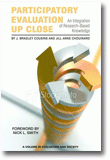
Participatory Evaluation Up Close
An Integration of Research-Based Knowledge
By:
J. Bradley Cousins, University of Ottawa
Jill Anne Chouinard, University of Ottawa
A volume in the series: Evaluation and Society. Editor(s): Stewart I. Donaldson, Claremont Graduate University. Katrina L. Bledsoe, Education Development Center.
Published 2012
Empiricism provides the backbone of knowledge creation within social science disciplines (e.g., psychology, sociology) and applied domains of study (e.g., education, administration) alike. Yet, relative to such domains of inquiry, comparatively little empirical research on evaluation has occurred, and the research knowledge base been infrequently synthesized and integrated to influence theory and practice. The proposed book aims to fill this void with regard to participatory evaluation, a set of collaborative approaches to evaluation that is receiving considerable attention of late, including a growing body of empirical studies.
The authors begin in Part 1 with the delineation of a widely known and familiar conceptual framework for participatory evaluation. They then use the framework in Part 2 as a guide to conducting an extensive review of the extant empirical knowledge base in participatory evaluation, culminating in a thematic analysis of what we know about the approach. In Part 3 the authors focus on methodological considerations of doing research on participatory evaluation through a critique of existing studies and an explication of design choices drawn from their own research program. The book concludes in Part 4 with implications for moving the field forward in terms of important research questions, methodological direction and evaluation practice.
This book will be of central interest to evaluation theorists and to those who choose to conduct research on evaluation; appeal will be conceptual and methodological. It will provide excellent supplementary reading for graduate students, many of whom seek to develop empirical studies on evaluation as part of their graduate programs. Rife with examples of participatory evaluation in practice, and practical implications, the book will also benefit evaluation practitioners with an interest in evaluation capacity building and participatory and collaborative approaches to practice.
CONTENTS
Foreword, Nick L. Smith. Preface. Acknowledgments. PART I: FRAMING PARTICIPATORY EVALUATION 1. Introduction. 2. Framing Participatory Evaluation. PART II: EXTANT EMPIRICAL KNOWLEDGE BASE 3. Methods and Description of the Knowledge Base. 4. Integration and Synthesis of Published Studies. 5. Making Sense of Research on Participatory Evaluation: Discussion. PART III: RESEARCH METHODOLOGY CONSIDERATIONS 6. Methodological Critique of the Knowledge Base. 7. Design Options from a Research Program on Participatory Evaluation. PART IV: THE WAY FORWARD: IMPLICATIONS FOR RESEARCH AND PRACTICE 8. Agenda for Research. 9. Methodological Considerations. 10. Practical Guidance. 11. Final Word. Conclusions. References. Author Index.
REVIEWS
"With the possible exception of research on the influence of evaluation findings and processes, there is probably no broader body of work in the evaluation literature than research on participatory evaluation. Cousins and Chouinard have drawn on their years of experience in conducting research on participatory program evaluation, teaching about the topic, and conducting participatory studies to produce what they correctly describe as "certainly the most comprehensive review to date of the research on participatory and collaborative approaches to evaluation, and quite possibly of any other domain of interest in evaluation."" Paul R. Brandon University of Hawaii in American Journal of Evaluation
-
Paperback978-1-61735-801-2
Web price: $45.04 (Reg. 52.99)
-
Hardcover978-1-61735-802-9
Web price: $80.74 (Reg. 94.99)
- eBook978-1-61735-803-6

- EDU026020 - EDUCATION: Special Learning Disabilities
- EDU018000 - EDUCATION: Language Experience Approach
- EDU037000 - EDUCATION: Research
-
 Disrupting Program Evaluation and Mixed Methods Research for a More Just Society
The Contributions of Jennifer C. Greene
Disrupting Program Evaluation and Mixed Methods Research for a More Just Society
The Contributions of Jennifer C. Greene
-
 Evaluation for a Caring Society
Evaluation for a Caring Society
-
 Growing the Knowledge Base in Evaluation
The Contributions of J. Bradley Cousins
Growing the Knowledge Base in Evaluation
The Contributions of J. Bradley Cousins
-
 Outcome Harvesting
Principles, Steps, and Evaluation Applications
Outcome Harvesting
Principles, Steps, and Evaluation Applications
-
 Practical Wisdom for an Ethical Evaluation Practice
Practical Wisdom for an Ethical Evaluation Practice
-
 System Evaluation Theory
A Blueprint for Practitioners Evaluating Complex Interventions Operating and Functioning as Systems
System Evaluation Theory
A Blueprint for Practitioners Evaluating Complex Interventions Operating and Functioning as Systems
-
 Visionary Evaluation for a Sustainable, Equitable Future
Visionary Evaluation for a Sustainable, Equitable Future

